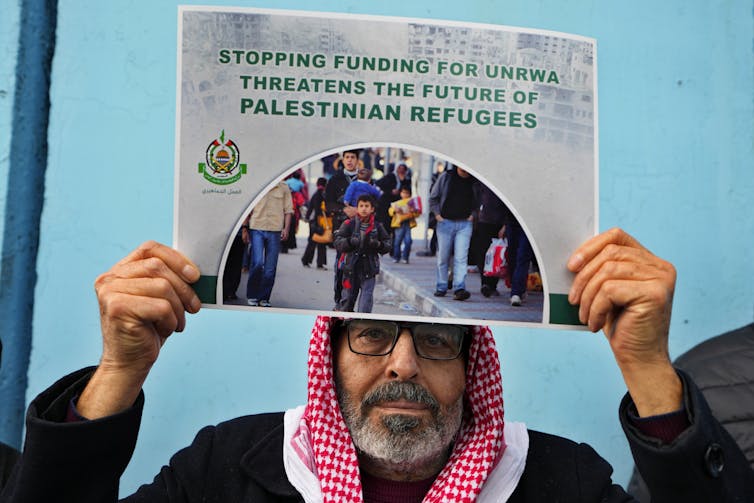Shortly after the International Court of Justice (ICJ) issued its ruling in the case brought by South Africa accusing Israel of committing genocide in Gaza, Israel accused 12 members of the United Nations Relief and Works Agency for Palestine Refugees (UNRWA) of being involved in the Hamas attack on Oct. 7, 2023. In response, UNRWA said it fired staff accused of involvement.
Israel demanded that donor countries cease all funding to UNRWA and claimed the organization is supporting Hamas. Additionally, Israel called for the cessation of UNRWA activities in Gaza after the war.
Sixteen mostly western countries, including Canada, the United States, United Kingdom and Australia, announced they were suspending their funding to UNRWA.
Western government officials said they have not been able to verify the allegations. U.S. Secretary of State Antony Blinken recently said, “we haven’t had the ability to investigate [the allegations] ourselves. But they are highly, highly credible.”
While Canada pledged $40 million for Palestinians in Gaza through alternative humanitarian channels, others like the U.S., U.K., Australia, Germany, Japan, Italy and Switzerland have completely suspended their aid, collectively representing over 60 per cent of UNRWA’s budget.
UNRWA has warned that unless funding is restored it may need to shut down by the end of February. This decision may have serious consequences, not only for Palestine, but also Israel and the broader region.
What is UNRWA?
UNRWA was established in 1949, and has been pivotal in providing humanitarian aid to Palestinian refugees since its inception. Following the Nakba (Catastrophe) in 1948, the agency was formed to respond to the urgent needs of the displaced Palestinian population.
It currently supports over six million Palestinians, employing more than 30,000 staff members, with a significant portion dedicated to operations in Gaza.
Operating under a mandate from the UN General Assembly, UNRWA offers essential assistance and protection to Palestinian refugees across the Levant, including Jordan, Lebanon, Syria, the West Bank (including East Jerusalem) and Gaza.
UN Secretary-General António Guterres recently said “UNRWA is the backbone of all humanitarian response in Gaza,” while UN Emergency Relief Coordinator Martin Griffiths said providing humanitarian assistance in the Occupied Palestinian Territories is “completely dependent on UNRWA being adequately funded and operational.”
Funding for refugees has long been politicized − punitive action against UNRWA and Palestinians fits that pattern
Israel’s accusations
A recent article in the Wall Street Journal cited an Israeli “intelligence dossier” claiming 10 per cent of the 13,000 UNRWA employees in Gaza have ties to armed groups. UN spokesperson Stephane Dujarric has said Israel has not yet shared the dossier with the United Nations.
While these accusations are serious, maintaining an objective approach and refraining from drawing hasty conclusions about the UNRWA’s 30,000 employees is crucial. The 12 employees accused of taking part in the Oct. 7 attack represent 0.04 per cent of the agency’s staff.
There are questions to be answered about the functioning of the UN agency, particularly regarding its recruitment and staff supervision processes. However, it would be misguided to generalize the conduct of one member or 12 to the entire organization. Particularly as the evidence Israel cites has not been made public.
(AP Photo/Hussein Malla)
Funding cuts aren’t new
Israel has long sought to dismantle UNRWA and the agency has faced the threat of funding cuts in the past. In 2018, former U.S. President Donald Trump cut funding claiming it was an “irredeemably flawed operation.”
Trump’s proposed “deal of the century” was based on sidelining the Palestinians in a bid to push for normalization between Israel and Arab governments.
Trump’s so-called Mideast ‘peace plan’ dispossesses Palestinians
Normalization has sparked controversy in Palestine and the broader region, particularly when it comes to the question of Palestinian refugees. Under Trump’s proposals, UNRWA would be dissolved and Palestinian refugees would lose their international legal status, a measure that would be challenging the historical right of return of Palestinian refugees.
UN General Assembly Resolution 194, passed in 1948, enshrines the right of Palestinian refugees to return home and receive compensation for losses suffered. UNRWA is an organization that recognizes the status of Palestinian refugees and, by extension, their right to return at some point.

(AP Photo/Bilal Hussein)
Palestinians, determined not to compromise their historical rights, rejected Trump’s agreement in the face of political and financial pressures.
It is also important to contextualize the allegations against UNRWA within Israel’s — and the United States’s — broader relationship with the UN. In 2019, both countries announced they were pulling out of the United Nations Educational, Scientific and Cultural Organization, claiming it has an anti-Israel bias.
In the months since Oct. 7, Israeli officials have called for the resignation of the UN Secretary-General, denied UN staff visas and rejected the ICJ’s ruling.
The humanitarian crisis in Gaza grows more dire by the day. Vital infrastructure, such as schools and hospitals, has been destroyed or severely damaged.
If UNRWA is unable to function, it could heighten political and social tensions in the region, especially in the countries hosting Palestinians, which will directly feel the repercussions of funding cuts.
It is imperative that foreign countries do not worsen the situation, but instead take steps to mitigate these negative repercussions and work towards finding humane, respectful and sustainable long-term solutions for the region.




